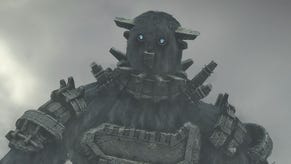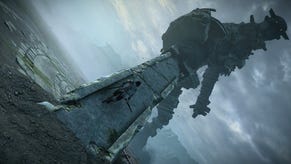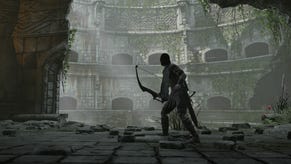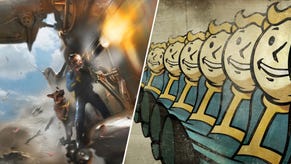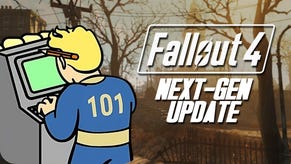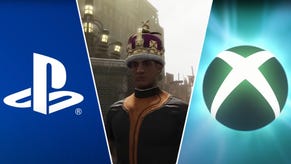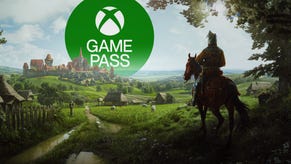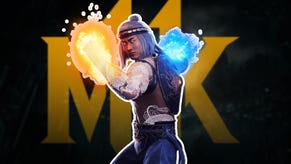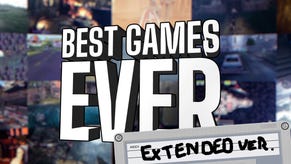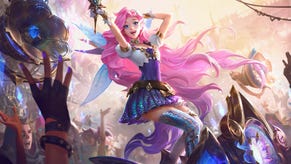The 15 Best Games Since 2000, Number 4: Shadow of the Colossus
Team Ico's beautiful puzzle platformer stands as one of the only games of its kind.
This article first appeared on USgamer, a partner publication of VG247. Some content, such as this article, has been migrated to VG247 for posterity after USgamer's closure - but it has not been edited or further vetted by the VG247 team.
We're currently in the middle of our daily countdown of the 15 Best Games Since 2000. After yesterday's dual perspective for Persona 4, we're back to one lone writer for today's entry! Want to read more? Check out the rest of the entries here.
There's no game that's really like Shadow of the Colossus. Some games have experimented briefly with its basic conceit - you as a small fragile figure up against a huge machine of potential destruction - but no title has made that the entire focus. There hasn't been anything like SotC before or since. To explain why, I may delve into spoilers here and there, so if you've never played it, I suggest you you skip this retrospective until then. Shadow of the Colossus HD was released on the PlayStation 3 as part of the The Team Ico Collection, so there's still a chance to play it before doing so becomes an exercise in digging through history.
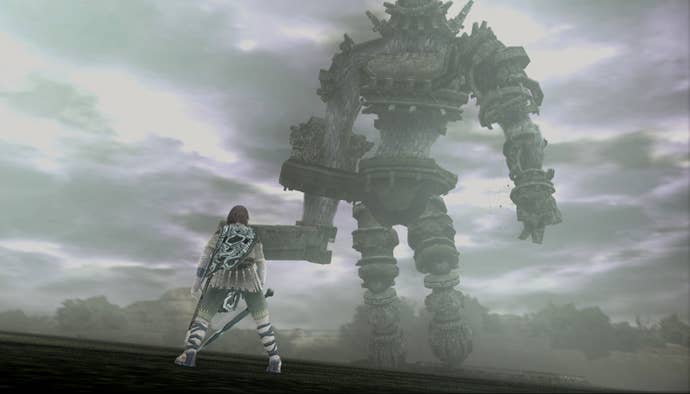
You don't need to beat the game to understand the magic of Shadow of the Colossus. Right from the first Colossus, the title embraces you. You're a lone soldier named Wander looking to revive a beautiful ethereal woman. To do so, you require the power of sixteen colossi, ancient creatures of stone and soul that dot the world, exploring aimlessly. Given simple clues by the shrine that houses the sleeping maiden, Wander ventures out into the world to destroy these creatures one by one.
The cast of Shadow of the Colossus is small: Wander, Wander's horse Agro, the formless entity Dormin, the mystic Lord Emon, and Mono, the woman who's the ultimate aim of Wander's quest. He wanders the world alone; there are no towns, no other NPCs to glean information from, no other outside indications of the righteousness of your quest. You are utterly alone with the results of your actions.
Each Colossi is alone in the Forbidden Lands where the game takes place. They are living their lives, moving around what might as well be their homes, passing in and out of the fog. Many don't even engage you until you insert yourself forecefully into their awareness. As you ride up to each one, there's a sense of scale and respect. Respect for the size and age of a thing you're about to destroy. Imagine if you had to deface the Mona Lisa, the ceiling of the Sistene Chapel, or Michelangelo's David in order to save a loved one. Would it be worth it, removing a piece of art that has touched so many and existed far before you, just to save a single life? That's the question before you in Shadow of the Colossus.
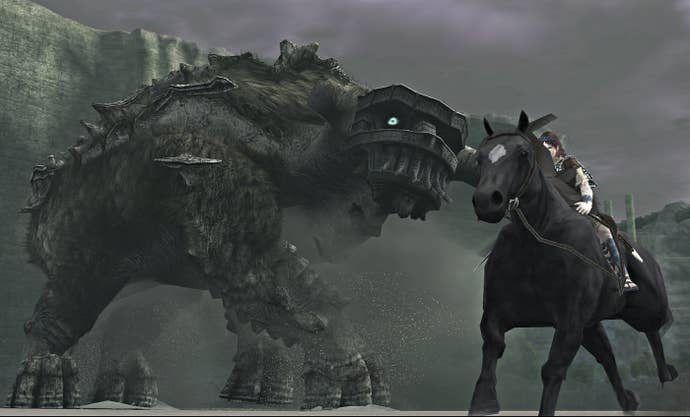
On each Colossus, there's a weak spot, an area that you must stab with your ancient sword in order to absorb their soul. The game has you climbing, leaping, and holding onto to each Colossus, a giant moving level that does its best to shake you off. They'll fight to survive, trying to dislodge you from the weathered, moss-covered stone that is their very skin. Sometimes it feels like they're begging you to leave them alone and let them live.
As you dig further into Shadow of the Colossus, your actions aren't met with an emotional feel of triumph. You are succeeding, yes, but to what end? When you finally drive your sword in for the killing blow, there's a sense of sadness. You've ended something beautiful, something without malice or rage. The Colossi were just living their lives. There's a feeling that the Colossi are older than time and Wander is doing a disservice by killing them. Is Mono deserving of this? Is anyone?
As the Colossi die, Mono slowly comes to life, but Wander himself becomes corrupted. His hair becomes darker, his face becomes sallow, and the stuff of shadows finds itself living under his skin. When Agro, your horse, sacrifices herself to save Wander later in the quest, even the player wonders if it's worth the cost. Agro stood as your only loyal companion through most of the game. Isn't her life as valuable as Mono's? Sure, the death is emotionally manipulative, the point at which many firmly turn against Wander's quest, but Shadow of the Colossus only has a few cards to play and it plays them well.
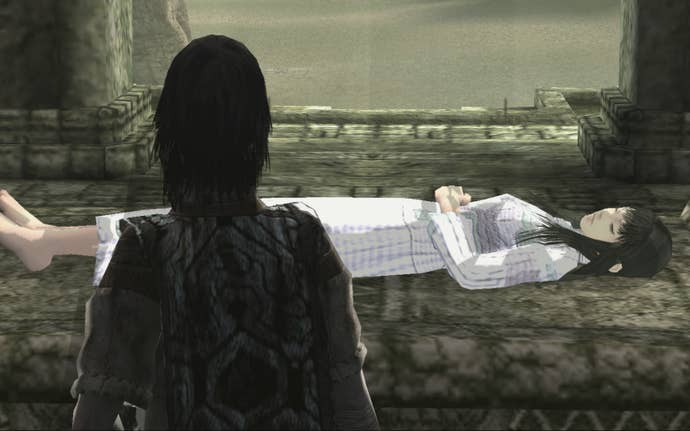
In the end, Wander's actions are as selfish and horrible as expected. You're not the hero. You're not even really the villain. You're just a particularly useful pawn, driven by love, sadness, or sheer guilt to shatter things that deserved to be left alone. When Wander's condemnation comes, the player is not only on the side of those condemning Wander, they're also complicit in his actions. It's an odd place to be as the final scenes of the game roll by.
Shadow of the Colussus is one of the few games that balances that feeling of winning and losing so well. As the credits roll, you as the player have succeeded. Wander's ultimate aim comes to fruition, but was it worth the cost? The lack of other characters, even the lack of English (everyone in SotC speaks in a made-up language), leaves you alone with the results of Wander's actions. While the game itself was thrilling and frustrating, in the end, you're left mostly with regret. Not for playing it, but for what you did while playing it. Shadow of the Colossus is not only a game, it's a question to you the player. Who are you? How far will you go?
Any game that makes you think like that deserves to be on this list.
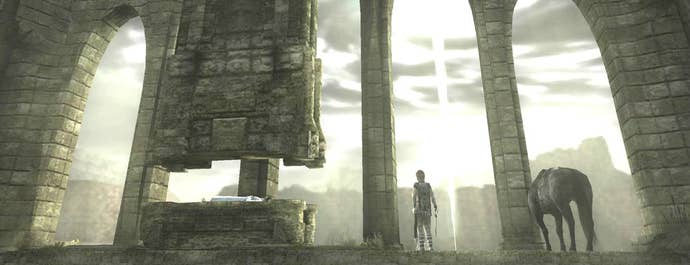


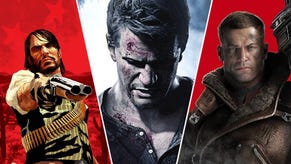
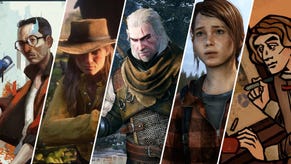
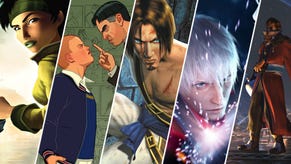
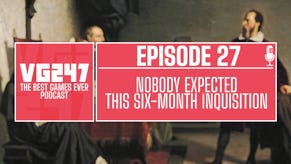
.jpg?width=291&height=164&fit=crop&quality=80&format=jpg&auto=webp)
